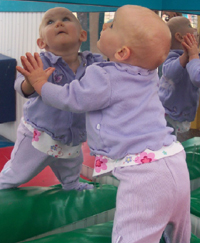
|
Pediatric Occupational, Physical, ABA/Behavioral, Feeding, Speech, and Language Therapies Main Clinic: 931-372-2567 1445 East 10th Street Cookeville, TN 38501 Email: [email protected] HIPAA Secure Email: [email protected] Fax: (931) 372-2572 ABA Clinic: 931-201-9534 400 Dubois Road Cookeville, TN 38501 Email: [email protected] Please call today to get started! Most insurances accepted! |

|
| Who needs therapy? | SE HABLA ESPAÑOL |
|
Home
> Feeding the Brain Pyramid
Feeding the Brain PyramidTherapy for the WHOLE brain & body! |
|
| COMPLEX & ADAPTIVE BEHAVIOR | ADJUST BEHAVIOR & INTERACTION STYLE TO FIT SITUATIONAL DEMANDS AND SOCIAL NORMS | PERFORM COMPLEX AND INTEGRATED TASKS | COMBINE PEOPLE INTERACTION SKILLS & TASK PERFORMANCE SKILLS/FOLLOW SOCIAL RULES |
| SKILLS RELATED TO SPECIFIC TASKS | VOCATIONAL ACADEMIC | DOMESTIC SELF-CARE | PLAY/LEISURE RECREATIONAL |
| SOCIAL INTERACTION ABILITY | DIFFERENTIATES PEOPLE VERSUS OBJECTS | EXPRESSES PREFERENCES AND WANTS | VARYING TONES OF EMOTIONAL EXPRESSION |
| BRAIN IS READY FOR CORTICAL LEARNING |
| PERCEPTUAL MOTOR ABILITY | COORDINATES GROSS AND SOME FINE MOVEMENTS | OCULARMOTOR CONTROL | VISUAL SPATIAL CONCEPTS | CENTER FUNCTIONS | MAKES POSTURAL ADJUSTMENTS | ASSOCIATES AND ORGANIZES SENSORY INPUT / AUDITORY LANGUAGE | EYE HAND COORDINATION |
| SUBCORTICAL LEARNING IS SUFFICIENT FOR BEGINNINGS OF CORTICAL LEARNING |
| | SENSORY MOTOR ABILITY | BRAIN CAN FILTER SENSORY INPUT | BODY SCHEME | POSTURAL SECURITY & GRAVITATIONAL SECURITY | BILATERALITY | MOTOR PLANNING | REFLEX MATURITY |
| Vestibular | Auditory | Visual | Proprioceptive | Tactile | Taste | Olfactory | |
| Healthy Gut Flora | BRAIN Foods | Daily Movement & Aerobic Exercise | SPECIAL DIETS SCD or GAPS | Feed the Myelin- DHA, purified water, anti-oxidants | Supplements: Probiotics, Digestive Enzymes, EFA’s, DHA, Cod Liver Oil | Decrease Toxic Load Increase Security Decrease Stress Oxygen, Sunshine, Being in Nature… |
At the Center of Development we firmly believe that true therapy means treating a patient as a whole.
Brain development and brain-body connections begin in the lower level of this pyramid with the gut. The gut is often referred to as the "little brain". When the gut is out of whack due to poor nutrition, food intolerances that are undiagnosed or not treated, decrease in probiotics or digestive enzymes, or bad diet habits then this has a direct effect on the next level...sensory processing.
Other factors on the lowest level of the brain that can affect development or the higher levels can be as simple as not enough Vitamin D, sunshine, or outdoor play time. Exercise plays a major role in the balance of our brains and bodies. Lots of research now exists to support our recommendations that children and adults get plenty of exercise and outdoor time! Too much screen time can have a detrimental affect on a child's development. These directly affect our sensory processing skills, our attention, our health and our wellness.
Some examples of the lower levels of this pyramid affecting the higher levels that we see everyday in our clinic include:
Sensory processing of movement (vestibular) can affect a child's ability to pay attention, focus, read, write, and function in their world. Something as simple as a child not being able to keep their balance with their eyes closed on one foot can be a huge sign that a child may have trouble staying still or seated for long periods of time in the classroom.
Poor visual scanning skills may start with a child's balancing system and visual systems not working together well. Yes, this means that a poor reader may need therapy for their balance and visual motor skills. Vision therapy can help address these skills.
An infant who dislikes belly time or doesn't crawl on time may be having sinus pressure from food intolerances...or they may have touch defensiveness and need OT treatment to calm down their touch system.
If a child is picky about textures on their skin the underlying cause may be a food intolerance.
Multiple ear infections can directly affect a child's auditory, speech, and language skills...and are often caused by a food intolerance or poor gut functions.
Poor core strength and muscle tone can cause a child to be fidgety in their seat and clumsy.
Children having issues with socialization may need to work on their sensory processing skills.
ADHD may have an underlying cause such as food sensitivity, lack of essential DHA or magnesium, or a sensory processing disorder.
Children with poor communication skills often have sensory processing issues.
We have a passion in helping to find the CAUSE of a child's delays and the right treatments to help the brain function at it's greatest potential!
Site empowered by
WebOnTheFly